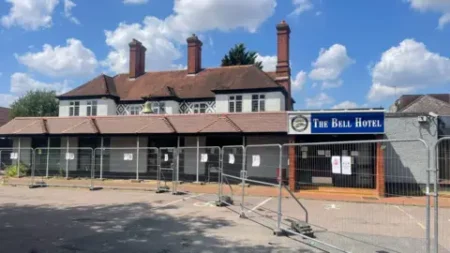In a heartbreaking incident that unfolded in Woolwich, South-East London, two teenagers, both now aged 16, have been sentenced to life in prison for the brutal murder of 14-year-old Kelyan Bokassa. On January 7, 2025, Kelyan was on the upper deck of a route 472 bus when he was viciously attacked with machetes by the defendants, who reportedly entered the bus with the intent to harm him. Their actions, described during the trial, were chilling; they smiled while carrying out the attack, underscoring the appalling nature of the crime.
Kelyan Bokassa, who was an aspiring rapper, was fatally stabbed after the assailants boarded the bus, specifically targeting him. According to evidence presented in court, he had been seated at the back of the bus when the two youths unleashed the attack, using what the prosecution referred to as “identical, lengthy machetes”. The Old Bailey heard how Kelyan had been somewhat anxious leading up to the incident—he had even concealed a small kitchen knife in the waistband of his trousers for self-defense, indicating he felt threatened.
Following their proceedings, both youths pleaded guilty to Kelyan’s murder as well as the illegal possession of a knife. The sentencing judge ordered that they serve a minimum of 15 years and 10 months before they are eligible for parole. The severity of their crime and the loss experienced by Kelyan’s family weighed heavily on the court’s deliberations.
During the trial, an emotional victim impact statement was read by Kelyan’s mother, Marie Bokassa. She expressed the profound grief and irreversible change in her life following the tragic loss of her son. Notably, she recounted spending Kelyan’s 15th birthday at his graveside, highlighting the lasting anguish that this senseless violence has inflicted upon her family. Her words resonated with those present, revealing not just the hurt felt by a mother but the broader implications of youth violence.
Additional findings in the case suggested that the assailants may have been informed of Kelyan’s location on the bus prior to their arrival. This revelation added a disturbing layer to the motivations behind the attack. During the court proceedings, members of the public reacted strongly to the evidence presented, with many visibly shaken as they watched footage of the attack. In stark contrast, the defendants showed no emotion while seated in the dock, a detail that left a haunting impression of their detachment from the gravity of their actions.
Prosecutor Deanna Heer KC outlined the events leading up to the tragic encounter, including Kelyan’s apparent apprehension just before he was attacked. CCTV footage depicted him looking around and surveying his surroundings, giving the impression that he sensed danger. The defendants, armed with machetes that they cleverly concealed within their clothing, boarded the bus approximately 20 minutes after Kelyan, signaling a premeditated assault.
This shocking case serves as a grim reminder of the escalating issue of youth violence in urban areas. The devastating impacts on families and communities reflect a societal crisis that warrants serious discussion and intervention. The details surrounding Kelyan’s murder paint a tragic picture of a life cut short, leaving behind heartache and prompting urgent conversations about ensuring safety and providing support for vulnerable youth.
As this case concludes, the impact of such violence on the larger community is brought to the forefront, intertwining personal loss with calls for broader societal change. The goal of safeguarding other youth from similar fates must remain at the heart of ongoing discussions surrounding violence in London and beyond. The story of Kelyan Bokassa is a somber reminder that behind every statistic is a young life filled with dreams and potential that has been irrevocably altered.











